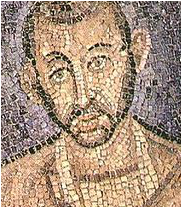The Merciful Judge does not withhold the hope of His forgiveness, and has as a Good Physician made known to you the remedies even against going astray. And so it was not without design that the holy Luke places in order before us three parables:
that of the sheep that strayed and was found,
that of the silver piece that was lost and also was found,
that of the son who was dead (through sin) and who returned to life;
so that sustained by this threefold cure we may seek to cure our own wounds: for a triple rope does not break.
Who are these three persons: the shepherd, the woman, the father? Is not Christ the Shepherd, the Church the woman, and God the Father? Christ Who took upon Himself your sins bears you upon His own Body; the Church searches for you; the Father receives you back.
As a shepherd He brings us back, as a mother He looks for us, as a father He clothes us. First, mercy, second, intercession, third, reconciliation; each to each; the Redeemer comes to our aid, the Church intercedes for us, the Creator restores us to Himself.
It is the same divine mercy in each operation; but grace varies according to our merits. The sheep that strayed is brought back by the Shepherd. The silver piece that was lost is found. The son turns back fully repentant from his sinful wanderings, and retraces his footsteps to his father.
[…] Let us therefore rejoice because that sheep which had fallen by the way in Adam is uplifted in Christ…; the Son of man is come to seek and to save that which was lost (Luke 19:10); that is, all men: for as in Adam all die, so also in Christ all shall be made alive (I Cor. 15:22).
Rich then is that Shepherd of whose portion all we are but a hundredth part. For He has besides the innumerable flocks of the Archangels, of the Dominations, of the Powers, of the Thrones and all the rest whom He left upon the mountains.
[…] Neither is it without significance that the woman rejoices because of the silver piece that was found. For this is no ordinary piece of silver, upon which is the figure of the Prince. And because of this, the Image of the King is the wealth of the Church.
We are His sheep; let us pray that He will place us amid the waters of His refreshment (Ps. 22:2). We are, I say, His sheep; let us seek of Him a place of pasture.
We are pieces of silver; let us jealously cherish our value.
We are children; let us hasten to our Father.
(Translated by M.F. Toale, D.D. @ Lectionary Central.)

